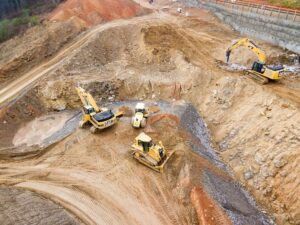Expert Kentucky Earthwork & Excavation Services by Earth Works, LLC
Earthwork and foundation preparation form the backbone of any successful construction project in Kentucky, determining stability and longevity from the very first excavation cut. By mastering excavation techniques, utilizing specialized earthmoving equipment, engaging expert grading contractors, and applying proven soil stabilization methods, general contractors and project managers can avoid costly rework and schedule overruns. This article explores the full spectrum of earthwork services—from site clearance and utility trenching to mass grading and ground improvement—while highlighting local terrain challenges, regulatory considerations, and advanced technologies such as GPS-guided 3D machine control. Readers will gain actionable insights into choosing the right excavation services, optimizing bulk earthworks solutions, integrating civil groundworks for infrastructure development, and selecting the ideal equipment hire strategy. Along the way, Earth Works, LLC’s expertise and value propositions illustrate how reliable, precision-driven approaches keep projects on track and within budget across Kentucky’s diverse landscapes.
What Are Earthwork Services and Their Importance in Kentucky Construction?
Earthwork services encompass all activities that prepare land for building foundations, roads, utilities, and other civil infrastructure, including excavation, grading, compaction, and site remediation. Proper earthwork ensures that soil bearing capacity, drainage, and surface levels meet engineering specifications, which directly influences structural integrity and project durability. In Kentucky, where clay-rich soils and rolling hills are common, precision site preparation mitigates settlement risks and prevents water accumulation that can undermine foundations.
What Does Earthwork Include: Excavation, Grading, and Soil Stabilization?
Earthwork comprises three core components:
- Excavation to remove or relocate earth material for foundations and trenches.
- Grading to achieve specified slopes and elevation profiles for drainage and surface uniformity.
- Soil stabilization to enhance weak or expansive soils through mechanical or chemical treatment.
Each component addresses a specific attribute of site development—volume control in excavation, surface geometry in grading, and load-bearing capacity in stabilization—to form a coherent framework that supports safe, compliant construction.
Why Is Earthwork Critical for Commercial and Civil Engineering Projects?
Commercial and civil engineering projects demand rigorous earthwork quality to support heavy structures, paved surfaces, and utility networks. When initial site preparation is insufficient, uneven settlement, pavement cracking, or utility misalignment can occur, leading to costly repairs and downtime. By implementing engineered cut-and-fill strategies and precise compaction protocols, contractors ensure that foundation soils meet design parameters and regulatory standards applicable in Kentucky.
How Does Local Kentucky Terrain Influence Earthwork Practices?
Kentucky’s varied geology—from limestone karst regions to clay-dominant river valleys—requires tailored earthwork approaches. Limestone near the surface may necessitate rock excavation methods, while high-plasticity clays benefit from lime or cement stabilization to reduce swelling. Understanding local soil profiles and groundwater behavior informs selection of excavation equipment and stabilization techniques, enabling efficient site preparation that avoids unexpected ground conditions.
Which Excavation Services Do Kentucky Contractors Need?
Excavation services in Kentucky span commercial development, residential sitework, deep foundations, rock removal, and utility trenching. Choosing the right service depends on project scope, soil conditions, and regulatory requirements for safety and environmental protection.
What Types of Excavation Services Are Offered by Earth Works, LLC?
- Commercial excavation for building pads and parking expansions.
- Residential excavation including basement digs and driveway subgrades.
- Deep excavation for foundations and basement structures with bracing systems.
- Rock excavation using hydraulic breakers and controlled blasting techniques.
By combining local knowledge with specialized machinery, the company delivers precision cuts and material handling that align with engineering plans and site constraints.
How Are Utility and Trench Excavations Performed Safely and Efficiently?
Trench excavation for water, sewer, electrical, and storm drainage lines demands strict compliance with OSHA regulations and Kentucky pipeline safety standards. Earth Works, LLC employs trench boxes, shoring systems, and real-time slope monitoring to protect workers and prevent collapses. Efficient spoil management and coordinated backfill sequencing minimize project downtime, while dust suppression and erosion control measures uphold environmental permits throughout excavation activities.
What Equipment Is Used for Excavation in Kentucky Projects?
A diverse fleet of heavy plant enables versatile excavation performance across varying ground conditions:
- Excavators ranging from 5- to 50-ton capacity for digging and loading.
- Bulldozers for bulk material push and rough grading.
- Skid-steer loaders for confined areas and utility trenches.
- Loaders and articulated haul trucks for material transport.
This heavy equipment mix allows contractors to optimize productivity, reduce cycle times, and maintain precise material handling from cut to fill.
How Does 3D Machine Control Improve Excavation Accuracy?
GPS- and TPS-guided 3D machine control systems integrate design models directly into excavation machinery, enabling operators to follow digital grade plans with centimeter precision. This technology reduces over-excavation, minimizes rework, and accelerates project timelines by automating slope verification and cut-depth checks. The result is consistent adherence to engineering tolerances, lower fuel consumption, and enhanced site safety through remote monitoring capabilities.
GPS for Earthmoving: Enhancing Productivity and Cost Savings in Construction
The Global Positioning System (GPS) is currently employed as a solution to promote high productivity and cost savings within the US construction industry, particularly in earthmoving activities over recent years. Consequently, there is a need to investigate overseas GPS implementation cases for their application in Korea. The overarching objectives of this study are to analyse advanced earthmoving systems utilising GPS, and to compare the work procedures and characteristics of both traditional and advanced earthmoving systems. This comparison will demonstrate the benefits of GPS implementation for geospatial construction data collection. It has been found that the dozer or grader operator maintains complete control of earthmoving operations in advanced GPS-equipped systems, guided by a screen conveniently integrated into the machinery. Accordingly, the operator receives information regarding the volume of cut and fill, along with precise grade specifications, ultimately achieving productivity improvements through procedural simplification by eliminating automated work tasks.
How Do Soil Stabilization Services Enhance Ground Stability in Kentucky?
Soil stabilization strengthens weak or expansive soils by modifying physical properties, thereby improving load-bearing capacity, reducing volume changes, and controlling moisture migration. These enhancements underpin durable structures and mitigate settlement issues common in Kentucky’s variable soils.
What Are the Common Soil Stabilization Methods Used in Construction?
Soil stabilization methods fall into three primary categories:
- Lime stabilization to reduce plasticity and improve workability of clayey soils.
- Cement stabilization to create a cementitious matrix that binds granular soils.
- Geopolymer injection using alkali-activated materials for rapid ground improvement in commercial developments.
Fundamentals of Soil Stabilisation with Cement and Lime
Soils can be stabilised by the addition of cement or lime. Such stabilisation processes improve the various engineering properties of the stabilised soil and generate an improved construction material. Increase in soil strength, durability, stiffness, and reduction in
A combination of horizontal mixing, in-situ injection, and dynamic compaction ensures uniform treatment and consistent strength gains across the site.
What Benefits Does Soil Stabilization Provide for Earthwork Projects?
Stabilizing soil delivers multiple advantages:
- Enhanced bearing capacity reduces required footing sizes.
- Controlled moisture limits seasonal heave and shrinkage.
- Reduced need for import of engineered fill lowers haul costs.
- Improved surface uniformity streamlines paving and landscaping.
These benefits translate into lower total project costs, accelerated schedules, and long-term performance reliability for commercial and civil works.
How Does Earth Works, LLC Implement Soil Stabilization on Site?
Earth Works, LLC follows a systematic process for stabilization: initial soil sampling to determine optimal binder type and dosage; precision mixing using mobile stabilizers; moisture content control through water injection systems; and final compaction with padfoot rollers to achieve target density. Continuous quality checks ensure that treated layers meet or exceed design strength parameters, and survey verification confirms compliance with specified elevations.
What Are the Environmental and Safety Considerations in Soil Stabilization?
Environmental and safety protocols govern stabilization projects to minimize dust, manage binder runoff, and control emissions of alkaline or cementitious by-products. Earth Works, LLC adheres to Kentucky Environmental Protection guidelines by using silt fences, sediment basins, and pH monitoring during mixing. Worker safety is maintained through PPE requirements, equipment guarding, and regular training on handling chemical stabilizers.
What Are Bulk Earthworks Solutions and Their Role in Large-Scale Projects?
Bulk earthworks focus on moving large volumes of soil to establish site grades and subgrades for commercial developments, infrastructural corridors, and land reclamation. Effective bulk earthmoving balances cut-and-fill quantities to minimize haul distances and environmental impact.
How Is Mass Grading Executed for Commercial Developments in Kentucky?
Mass grading operations begin with topsoil stripping and stockpiling for reuse in landscaping. Electronic site models guide bulldozer and scraper fleets through coordinated cut-and-fill loops that align with approved elevation plans. Temporary drainage channels and erosion control blankets are installed concurrently to maintain surface water management throughout construction phases and protect adjacent properties.
What Challenges Are Common in Bulk Earthworks and How Are They Overcome?
Key challenges include varying soil moisture, hidden sinkholes in karst terrain, and equipment scheduling across large sites. Addressing these requires thorough geotechnical investigations, real-time moisture monitoring, and adaptive haul route planning. Earth Works, LLC mitigates risks by integrating drone surveys, deploying compactors in wet zones, and implementing fall-protection systems on slopes steeper than OSHA limits.
Which Heavy Earthmoving Equipment Is Essential for Bulk Earthworks?
Effective mass grading relies on specialized large-capacity machinery:
This equipment ensures high productivity, precise grade control, and efficient material distribution over extensive project areas.
How Do Civil Engineering Groundworks Support Infrastructure Development?
Civil groundworks integrate earthwork services with structural elements to prepare sites for roads, bridges, utilities, and other public works, ensuring that foundational systems meet performance and safety requirements.
What Site Preparation Services Are Provided for Road and Utility Projects?
Site preparation for roads and utilities includes clearing vegetation, regrading alignments to specified slopes, installing sub-surface drainage systems, and constructing access ramps. Earth Works, LLC coordinates excavation of roadbeds, placement of aggregate subbases, and installation of stormwater cut-offs to comply with Kentucky Transportation Cabinet standards and local permitting requirements.
How Does Ground Improvement Enhance Project Durability?
Ground improvement techniques such as deep soil mixing, dynamic compaction, and geotextile reinforcement strengthen subgrades against rutting and settlement. By improving shear strength and reducing compressibility, these methods extend pavement life cycles and minimize maintenance costs for roadways and utility corridors.
What Safety Regulations Govern Civil Groundworks in Kentucky?
Civil groundworks must adhere to federal OSHA trenching and excavation standards, Kentucky Division of Water erosion control rules, and municipal road-opening permits. Requirements include shoring for trenches deeper than 1.2 m, dust control during earthmoving, and regular inspection of protective systems by competent persons to prevent cave-ins and environmental violations.
Where Can You Hire Earthmoving Equipment in Kentucky for Your Project?
Access to modern, well-maintained plant through hire arrangements enables contractors to scale capacity without long-term capital investment, aligning costs with project durations and peak workloads.
What Types of Heavy Plant Are Available for Hire in Kentucky?
Equipment hire fleets typically include:
- Hydraulic excavators in multiple size classes.
- Bulldozers with multi-shank rippers for breaking compacted layers.
- Wheel loaders and articulated dump trucks for material handling.
- Motor graders for precision roadworks and finish grading.
Renting from local plant organizations ensures rapid delivery, scheduled maintenance, and operator training support tailored to Kentucky jobsite conditions.
How Does Equipment Hire Support Project Efficiency and Cost Control?
Hiring earthmoving equipment removes ownership burdens such as depreciation, storage, and major maintenance, converting capital expense into predictable operating costs. Contractors can adjust fleet size to match project phases, optimize cycle times with newer machinery, and avoid downtime by leveraging rapid replacement services offered by hire providers.
What Are the Latest Technologies in Earthmoving Equipment?
Modern hire fleets increasingly feature GPS-integrated dozers, telematics for real-time equipment health monitoring, and semi-autonomous control systems that enhance safety and productivity. Electric and hybrid machinery options are emerging to reduce fuel consumption and emissions, aligning with sustainability goals in large infrastructure projects.
Why Choose Earth Works, LLC for Your Earthwork and Excavation Needs in Kentucky?
Earth Works, LLC stands out for its combination of experienced personnel, advanced equipment, and local terrain expertise that collectively ensure precise, reliable project delivery across Kentucky.
What Experience and Expertise Does Earth Works, LLC Bring to Projects?
The team at Earth Works, LLC comprises certified equipment operators, civil foremen, and geotechnical specialists who collaborate to translate engineering designs into accurate site execution. Their track record includes complex projects such as industrial site expansions, municipal utility installations, and high-volume mass grading contracts.
How Does Earth Works Ensure Project Timeliness and Budget Compliance?
A rigorous planning and scheduling protocol, real-time progress tracking, and proactive risk management enable Earth Works, LLC to maintain tight control over timelines and costs. Weekly site reviews, digital timekeeping for equipment, and transparent reporting keep stakeholders informed and aligned with project milestones.
What Client Testimonials and Case Studies Demonstrate Earth Works’ Success?
Clients consistently commend Earth Works, LLC for minimal change orders, adherence to quality benchmarks, and swift resolution of site challenges. Recent case studies highlight on-time completion of a commercial parking lot expansion and efficient rock excavation for a manufacturing facility, both delivered within forecast budgets and with zero safety incidents.
How Can You Request a Quote or Consultation for Earthwork Services?
To discuss earthwork requirements for your next Kentucky construction project, contact Earth Works, LLC’s project coordination team through their website or business profile. A detailed proposal, including scope definitions, equipment plan, and preliminary cost estimate, will be prepared promptly based on your project specifications.
Each component of comprehensive earthwork—from initial excavation to final subgrade—plays a pivotal role in construction success. By leveraging advanced techniques, cutting-edge equipment, and local geological knowledge, contractors and project managers in Kentucky can achieve stable foundations, efficient site workflows, and predictable budgets. Earth Works, LLC’s specialized services and precision-driven processes exemplify industry best practices that keep commercial and civil engineering projects on track and within compliance standards.


